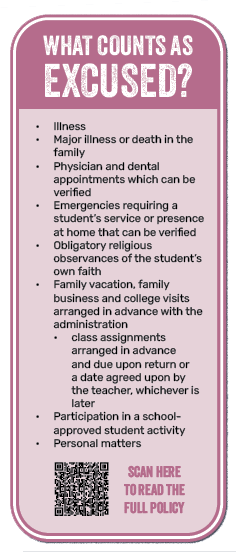The new school year has brought significant changes to BV’s policies, sparking debates around the school. The ban on cell phones during class, stricter rules on absences and efforts to clear out hallways dung class periods aim to promote a more focused and efficient learning environment, but not everyone is convinced.
Old School, New Rules
Words by Ashling Bahadursingh
Across the Blue Valley student body, there are varied responses to the new changes in school policy. Senior Mason Chidlow shared his thoughts on the adjustments.
One of the new rules is that students have to eat lunch in the commons, whereas previously they could eat in the hallways or classrooms.
“I ate in the senior hall, which is really nice because it wasn’t so packed,” he said. “When the administration is saying they’re going to not allow anybody to eat across different areas of the school, it’s pushing that capacity. In the commons, people’s chairs are touching, it’s so packed — it’s hard to get in and out of there.”
The ban was put in place in order to prevent trash and distractions in the hallway, but Chidlow believes it wasn’t the best way to deal with the issue.
“Jumping straight to, ‘Let’s lock down the halls’ was a bit of a stretch — there’s plenty of trash cans around the building,” Chidlow said. “They really jumped the gun on that.”
Childow would’ve taken different measures with students eating in the halls.
“For the lunchroom policy, they should be finding other ways to combat the issues they’re seeing with students eating in the hall and not just locking them into the commons and then packing us all in there,” he said.
Although he understands the restriction on phones during class, Chidlow’s opinions on the ban during downtime in the day aren’t as positive.
“It’s just an overcorrection to what’s really needed — I find it really tough especially for club leaders,” he said. “Advisory is one of the biggest times that we meet, and one of our biggest sources of communication is GroupMe, so by not allowing [us] to have our phones during AST and advisory puts a burden on that communication between our clubs and our activities. If you’re having a club meeting for whatever you’re involved in, how are you going to get that message if you [don’t have] your phone?”
Chidlow believes that the adjustments were not the best way to seek improvement.
“There’s a small issue, and then they kind of overreact,” Chidlow said. “Just saying no cell phones isn’t going to be the solution. It may help, but it’s not going to be a complete solution. I think they need to be finding other ways to motivate students.”
Policy or Procedure?
Words by Sami Sandler
At the beginning of the school year new rules and procedures were introduced. While students, teachers and parents have varying opinions about these rules, most of them are unfamiliar with the processes and reasons for the regulations in place.
“Policy is something that the board sets and procedures are things the administrative teams [decides],” principal Charles Golden said. “There’s a lot of school level procedures that land on my shoulders, but in reality our school’s decisions [are] made by groups of leaders and consensus.”
A lot of the procedures in place were made up by our school’s leadership and administrative teams.
“The leadership team, which is department chairs and a few additional teachers, get insights from student leaders and teachers,” Golden said.
These rules don’t just pop up for no reason, however.
“[When] we recognize that we’re not satisfied with something, whether it’s behavior, an academic output or school culture, we keep mulling it over until we decide the next thing we’re going to try,” Golden said.
One school-level choice made by these teams was the extra credit for having five or fewer tardies and absences each semester.
“Looking at numbers of absences and tardies we thought those were not the numbers we were happy with — we needed to experiment,” he said. “We had worse attendance and tardies last year than we did before. The feedback we got through the year from families who contacted us saying, ‘You’ve just given my child one more thing to be anxious about. You’re driving an anxiety culture.’”
When it comes to implementing district policies, administrators approach each one thoroughly.
“We [consider], ‘What does it say?’, ‘What does it imply?’, ‘Does it leave room for interpretation?’” he said.
They evaluate the playing field, for example, in regards to the phone policy.
“From bell to bell, students can’t use their personal electronic devices — these have to be silenced and stored out of sight,” he said. “If the teacher directs them otherwise, it’s got to be for something that serves an educational goal.”
While there typically isn’t pushback from new rules, some students and parents experience confusion as to why they are in place. The new restrictions on spaces to eat lunch comes from helping out the custodians.
“We had a lot of messes all over the building [from lunches], and we have limited custodial staff who work really hard but don’t have enough people power to clean the whole building,” Golden said. “Another piece of it is distractions. We tried [having flexible options to eat] but there was an increasing chorus of teachers who would find their classes interrupted by what was going on in the hallways.”
Whether implemented on a school or district level, policies are put in place in the students’ best interest.
“The board has made a really good decision for kids and for kids’ learning,” Golden said. “We are doing what’s right by students in the education process.”


Attendance Policy
Words by Lucy James
As per Kansas state law, if a student has missed three consecutive unexcused days, five unexcused days per semester or seven unexcused days per year, they are declared truant.
When a student is declared truant, a notice is sent to the District Attorney’s office, who then decides if the student qualifies for the truancy program. If the student does, a letter is sent to their parents or guardians, and they must attend the program for at least 90 days.
If the student does not qualify, the District Attorney’s office will either forward the information to the appropriate agency or file a truancy hearing with the court.
This new attendance policy is a big change from last year’s extra credit policy. Many students and parents liked this policy, but many teachers and administrators didn’t.
“I felt like that bonus policy was a participation trophy mentality,” biology teacher Audrey Denges said. “I felt like I was giving extra credit for something students have been expected to do since before I was even born.”
An excused absence can vary to many things from participation in a school activity to religious reasons. An unexcused absence can vary from leaving campus during the school day without a pass to senior skip days.
If a student does need to leave school for an excusable reason, they must have parental verification before they leave; it must be reported to the attendance office hotline at least an hour before the student has to leave.
The new policy for the 2024-25 school year is that once a student has seven days of excused absences, any additional absences count as unexcused unless supported by appropriate documentation.
When students have seven excused absences and gather seven more, for a total of fourteen, they are reported for truancy.
Many students liked the extra credit policy, but it did not impact attendance or tardiness as much as administrators and teachers hoped.
“A lot of students feel like it’s absurd, but they’re ignoring the fact that it’s an unexcused policy,” Denges said. “The seven unexcused policies will have a better outcome — not only is it holding the students accountable, but it’s also holding their families or parents accountable as well.”

Cellphone Code
Words by Benjamin Werner
The phone policy has been ramped up from previous years to a stricter expectation. Phones must be out of sight unless instructed otherwise by the teacher, and when heading to the bathroom, students must leave their phones in place of the provided hall pass.
Anatomy and physiology teacher Dianne Dunn supports the phone policy, believing that phones can negatively affect students’ education.
“For a lot of students, phones are a major distraction,” she said. “It’s easy to get sucked into using the phone for different things, and so to have a policy that is now consistent and supported by the school board, I think [it] will help us get used to maybe stepping away from our phones and putting our focus in other places, hopefully, academic.”
Also hoping for consistency in other classes, Dunn only lets her students use phones for educational purposes.
“I feel like they’ve already put the little disclaimer in there that if the teacher feels like the cellphone would be an appropriate thing to use for an activity, we have the ability to [allow] that,” she said.
Dunn said phones shouldn’t be used during a test so as not to cause uncomfortable situations with students; however, falling victim to hers, Dunn said she sometimes catches herself absorbed in her phone.
“It’s easy to lose time and be scrolling — [it’s] human nature to get sucked into it,” she said.
With an opposing opinion, business teacher Dwight Williams speaks about the policy.
“I am in full agreeance of it, and I see why it was put in place, but I think we’re missing an opportunity to teach students some life skills with their phones,” he said.
Williams said almost every adult in the district is guilty of being on their phone and that he understands. In addition to the staff, Williams thinks this clean-cut from phone usage has long-term consequences for students.
“Someday, every student in this building is going to be in college on their own,” he said. “They’re going to have a job, be in a leadership role, own a business [or] be in meetings and in classes where no one’s going to be telling them to put their phone away. That’s just a conscious decision that they’re going to have to make as a responsible adult. I think we’re losing out on an opportunity to teach them those things.”
Wanting what’s best for students, Williams has seen them more involved with the stricter phone policy.
“I see students talking to each other more [and] more engaged in classroom discussions because they don’t zone out on their phones,” he said.
Williams believes phones can positively affect student education.
“I personally like to listen to music when I’m working on certain things — I can concentrate better,” Williams said. “I allow them to take their phones out and listen to music. I’ve honestly never had any phone issues in the past 12 years.”
Dunn, however, said she has seen phones having a more negative impact on student education.
“Phones are helpful to look things up quickly, but I think they have the ability to pull students in so many directions,” she said. “It’s more of a liability than it is a benefit.”
Student Survey
How would you change the policies?
“The headphone policy is absolutely ridiculous. I just wanna listen to some music during silent work time or during AST.” – Maddi Pruett, 11
“I’d let us eat outside of the lunch room and make it so that phones are away in bags but not put in a certain place in the classroom.” – Reagan Gallentine, 10
“I think the phone rules should be up to the teacher. I really haven’t noticed any difference in students this year besides frustration.” – Bo Patterson, 10
How have these changes affected BV’s culture?
“People interact with each other more — no more sitting on [your] phone while waiting for class to start.” – Ella Edwards, 12
“I think that having these stricter rules has allowed students to be more focused during class.” Ava Aslinia, 12











